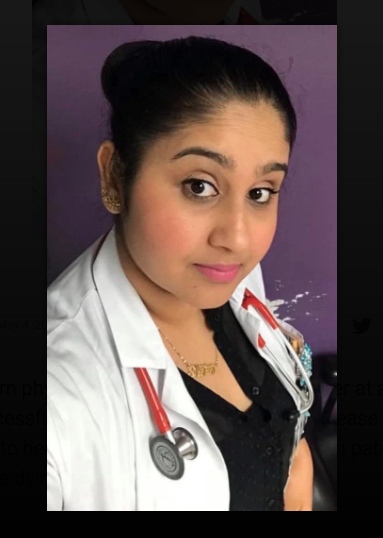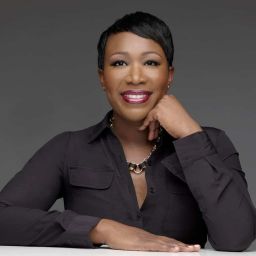Guyanese-born physician assistant, a frontline worker at a New York hospital, successfully beat the novel coronavirus disease (COVID-19) and returned to her job when it was “overloaded” with patients, many of whom were dying. Shara Khan told Stabroek News (SN) she was not prepared for what came next. The facility was turned into a Covid-19 hospital.
“I badly wanted to go back to work as I knew there were people there that needed help. This was the reason I went into the medical field; it was to help others (but) being on the frontline is nothing that I had ever trained for,” she told this newspaper.
“The amount of sickness and death that I have experienced will change my outlook on life forever. Our systems were never designed to handle this amount of suffering all at once with multiple patients crashing at any moment.”

Khan was diagnosed very early in the pandemic, around mid-March and said her symptoms were mild.
“I had low-grade fevers that was associated with frontal headaches, vomiting, chills, weakness, and body aches. My first symptom was the complete shutdown of my body. I remember that day vividly, after a grueling day at work, I came home telling my husband: ‘I’m so exhausted and feel weak’”, she said.
At first, she thought nothing of it and brushed it off as exhaustion from her workload.
Khan managed to have her condition resolved in about four days but her results were not back as yet.
She recalled lying on the couch the day after her symptoms started, “and my body just shut down… I couldn’t move and immediately fell asleep.”
When she woke up she was still feeling weak. She tested her temperature and realized she had “low-grade fever.”
At that point, she did not want to take any chances and “immediately went into defense mode. I wore a mask, Lysol-sprayed the whole house, wore gloves, and went into quarantine in my attic.”
I slept all night as I was still feeling drowsy and weak. The next day I had a severe headache that ultimately made me vomit.”
She was isolated from her husband, Dr. Aftaab Aliahmad, her two young sons and her parents. She also continued her precautions to wash her hands frequently and wear a mask and gloves.
She contacted her hospital’s employees’ health department to call in sick and based on her symptoms, they recommended that she get tested.
The physician who did the test asked her if she was sure she was not pregnant and she said she was. He then told her she was borderline either with flu or COVID.
“After about a week I received a call stating I was positive. I was shocked! I felt like my whole world was turned upside down. After a few hours, I pulled myself back together. I thank Allah that at least my symptoms were not that bad, and at least I’m still alive,” she told this newspaper.
“I was lucky to have both my mom and husband helping with the kids, ensuring everything was done for them and they were comfortable.”
She used only Tylenol, which “helped with the headache as I read ibuprofen worsens symptoms.”
Everything changed
“I worked on an inpatient internal medicine floor and one week back into work everything changed,” she told this newspaper.
Khan is among four physician assistants, a nurse practitioner, and an attending physician that normally works as a team.
“We were going to be reassigned to a COVID-19 unit with an infectious disease consulting physician assigned to our unit to aid us. Instead of the hospital, I knew, the system I knew; everything was overturned by COVID-19 in the blink of an eye.”
The hospital was overwhelmed. There were not enough beds, equipment, protective gear, and staff members.
Intensive care units were opened up at every available space.
Khan told SN too that: “Every day at work was a constant struggle just to have the proper equipment… That made this struggle even worse because we are unable to take care of patients without worrying about our own safety.”
They were told that they should reuse their N95 mask, which is against standard practice.
She then decided to take matters into her own hands and asked family and friends to donate supplies to her unit.
“After all, I value my life. I have people relying on me and I need to be there for my kids,” she said.
A friend got her P100 respirator masks while her family donated disposable gowns, N95 masks, and shoe covers.
“Many days we barely have time to eat or take a break. There was always something happening. One moment the patient is doing well and in the blink of an eye, the patient is crashing,” she reiterated.
All hope was not lost though because she has seen patients who were close to dying but recovered within a few days and would be discharged.
“Amidst all the chaos, those are the moments we cherish,” she said.
Almost all of the patients were on vents and Bipap. They needed supplemental oxygen as the virus attacks the lungs.
Chest x-rays for COVID patients showed multifocal pneumonia, a virus that attacks, not only the lungs but the blood as well, putting patients in a hyper-coagulable state.
She explained: “This means that the blood gets thick and can form clots which leads to pulmonary embolisms and cardiac arrest.”
A typical day in the hospital now “consists of codes after codes: code 66 (rapid response team) then sometimes 88 (emergency response team) and then 99 (respiratory/cardiac arrest).”
She added that “almost every few minutes you would hear different floors, different teams paging respiratory therapy. Sadness everywhere. All I could do was pray, pray that they make it, and try my best to save as many lives as I can.”
Sadly, due to the pandemic, the “patients’ families were not able to be at their sides so you become their family, you hold their hands and take the best care of them.”
Although she sometimes felt defeated, she said, “you have to look at the light at the end of the tunnel; mine was my family, my kids, my parents, and my husband. What I was doing is trying to make it a better place for them.”
Her message to everyone is to “take proper precautions. Wash your hands, practice social distancing, stay 6 feet apart, wear a mask, wear gloves, stay at home, and don’t have large gatherings. This cannot be overstated but, please stay at home because we can’t. We are risking our lives, putting our families at risk.”
She was relieved that by the end of April the hospitals in New York were slowly getting back to their normal functioning status, although they still have COVID-19 patients.
“I am praying for things to get back to some level of normalcy. To all those who lost loved ones due to this horrible pandemic, my thoughts and prayers are with you. God Bless…,” Khan stated.










